The artificial intelligence chatbot by OpenAI, ChatGPT has been causing a bit of a stir in many industries, including marketing. With an insane number of possibilities for its use and the potential to streamline or even eradicate some functions, it’s clear to see why the ‘prompt and provide’ tool is gaining so much traction.
More broadly AI is increasingly infiltrating our daily lives, with tools able to create deep fake audio snippets based on a small sample of someone’s voice, and others capable of producing breath-taking art or images from simple prompts.
But ChatGPT since its launch in November 2022, feels different.
I think the reason why is partly down to two key factors. The first is that due to the sheer size of its reference data, it has mass market appeal and endless use-cases. Rather than going to Google, YouTube, Quora or any other online resource, prompting ChatGPT appears to be able to provide much more relevant responses.
Building on the first point is the fact that it ‘appears’ to provide human-like responses in a conversational way. This then leads to the second key factor as to why it has taken off so quickly:
The ChatGPT model is a flagship example for another phase of digital transformation that has been on the horizon for some time now. And that is, utilising AI technologies to eliminate the need for humans to carry out certain functions.
However, before we get too excited or anxious about this, we only need to look back 25 years to the dot com bubble to realise that it’s not as clear cut as that.
Remember, in the late 1990s we were promised that we’d only buy things online and that bricks and mortar was doomed, particularly in retail. And, yes, in some cases that was true but in most it simply opened up the doors to a world of new possibilities.
Now, this piece is called the ‘do’s and don’ts of using ChatGPT for SEO’ so I guess I better move on from the backstory.
ChatGPT and SEO
Like many industries, ChatGPT has many potential applications and benefits for conducting SEO. Some ‘gurus’ have been completely mesmerised by the tool and claim it can completely eradicate many functions humans perform to improve search rankings for websites.
However, that’s not what we’ve found.
Below are some trials to see how well ChatGPT performs. In some areas it does a good job, in others, it needs a bit more guidance, and in some aspects, it’s just plain wrong.
Identifying seed keywords
When prompting ChatGPT to define seed keywords related to home loans it did a fairly good job.
However, given that the reference data only goes up to 2021, it’s still far from the level of data you can receive from other free tools such as Google’s Keyword Planner, UberSuggest or even Search Console.
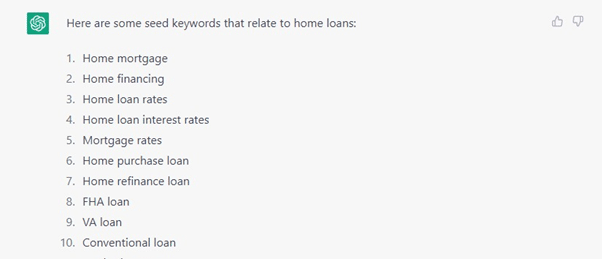
Write catchy blog titles
Credit where credit is due. When it came to writing catchy titles, ChatGPT quickly generated ten options that all could be solid nominations for this particular blog.

Create content outlines
One of the hardest parts of writing fresh content is identifying what to include. I believe ChatGPT could be helpful for ideas to include within a content outline, however, there are some drawbacks.
This particular list was quite repetitive and long. In addition, due to the historical data it can reference, I feel like important, topical items were missed. Such as the current increases in interest rates and how that may impact someone seeking a home loan.
It feels a little generic and potentially, could lead to writing something very beige.
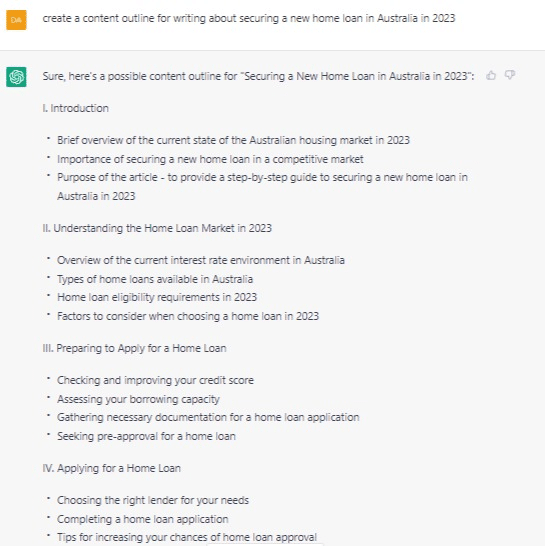
Proofreading
If you need a sidekick to give your piece of text a once over, then ChatGPT could very well be your first set of eyes.
You can ask ChatGPT to proofread your text and it will provide some advice and tips on what to change.
I did notice it had a bias toward American English, however, that can easily be resolved by including Australian English in the prompt.
In addition, I don’t think it is anywhere near as powerful as other proofreading tools such as Grammarly. Therefore, I wouldn’t cancel your subscription to that service just yet.
Rewriting the odd sentence
Writer’s block is a real problem. And sometimes the words just don’t come naturally. Using ChatGPT to re-write sentences, even in the style of a specific author, is really useful. However, you do need to have a solid base of information for it to use.
Like the content outline example above, if you don’t give plenty of detail in your instructions, its replies can be a bit generic.
Drafting meta titles and descriptions
When prompted to draft a meta title and description for a blog piece, ChatGPT provided a very engaging response. However, the first response was way too long. Overshooting the character limits for both the meta title and description.

That being said, the problem was easily resolved when the prompt specified the character limits to take into account.

Creating Regular Expressions (REGEX)
REGEX (short for Regular Expression) in Google Search Console is a tool that allows website owners to conduct more advanced filtering and reporting. For example, filtering queries to show longtail questions people may be using to find your website.
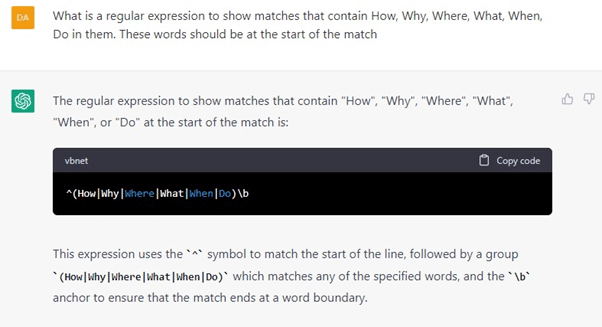
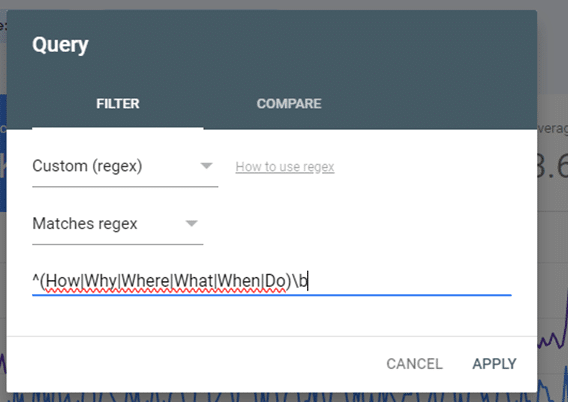
Content Creation
Whilst there has been plenty of talk about using ChatGPT to create content, it is clear that there are a lot of problems. Relying solely on a chatbot to create content has many shortcomings.
The first and, hopefully, the main reason, is that it simply isn’t creative. It currently isn’t able to tap into your subconscious and talk the way you talk.
It also hasn’t walked your walk. So it doesn’t have access to your knowledge, expertise or experience. Omitting such things from your content can make it bland and generic.
There is a lack of point of difference (POD) too. If you have access to ChatGPT, and your competitors do, and your customers do, simply regurgitating content from the chatbot is likely to fall short of anything new or exciting.
And if you were still wondering why you shouldn’t solely use ChatGPT for creating content, here’s some information straight from the horse’s mouth….
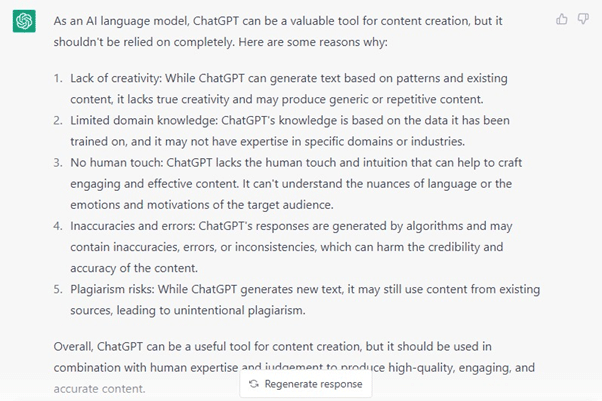
Ironically, I couldn’t say it better myself: “it should be used in combination with human expertise and judgement to produce high quality, engaging, and accurate content”.

